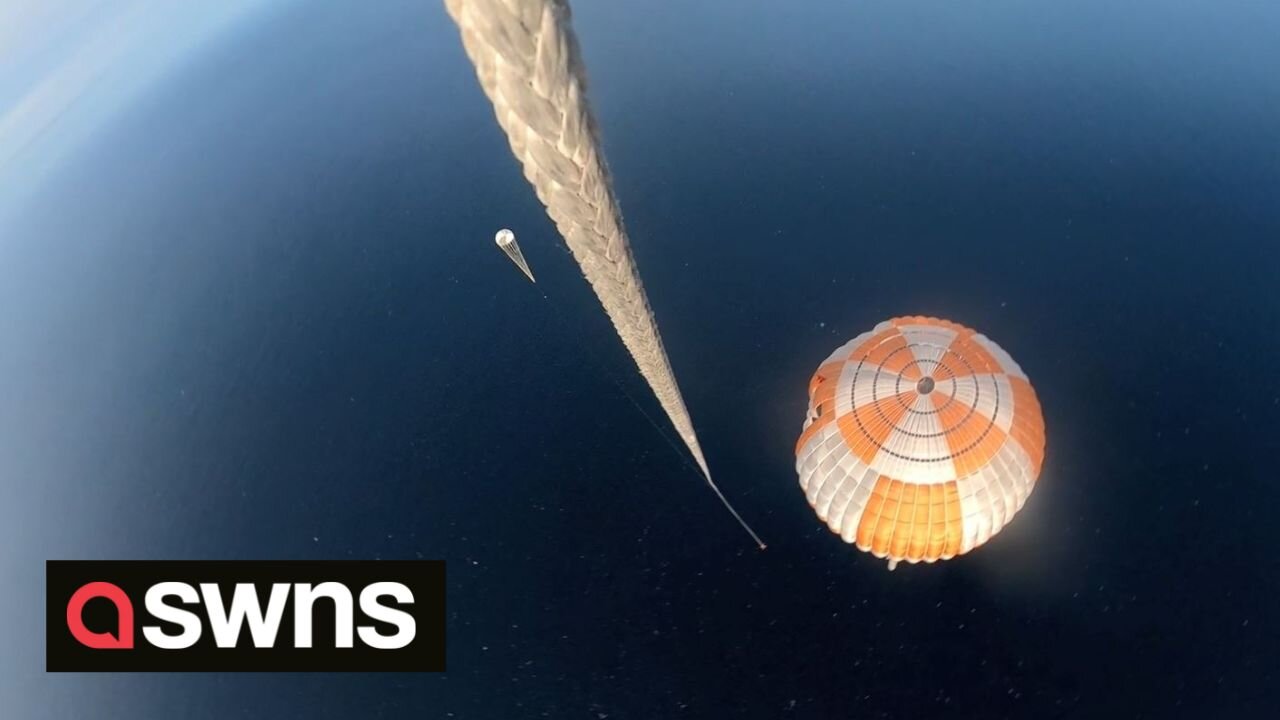Premium Only Content

Space company will attempt to catch an Earth-bound rocket - by helicopter
A space company will attempt to catch an Earth-bound rocket - by helicopter.
The launch is scheduled to take place on Friday (29 April) from Rocket Lab’s complex on New Zealand's Mahia Peninsula.
The “There and Back Again” mission will be Rocket Lab’s 26th Electron launch and deploy 34 satellites to a sun synchronous orbit for a variety of customers.
Like previous recovery missions, Electron’s first stage will undertake a series of complex manoeuvres designed to enable it to survive the extreme heat and forces of atmospheric re-entry.
Electron will be equipped with a heat shield to help protect the stage’s nine Rutherford engines and a parachute to slow Electron down in order for Rocket Lab’s customised Sikorsky S-92 helicopter to catch the stage as it returns.
Upon success of this recovery, Electron will be one step closer to being the first reusable orbital small sat launcher.
Rocket Lab explain: “Catching a returning rocket stage mid-air as it returns from space is a highly complex operation that demands extreme precision. Several critical milestones must align perfectly to ensure a successful capture.”
The satellites are being transported for customers including Alba Orbital, Astrix Astronautics, Aurora Propulsion Technologies, E-Space, Spaceflight Inc., and Unseenlabs, bringing the total number of satellites launched by Electron to 146.
“We’re excited to enter this next phase of the Electron recovery program,” said Rocket Lab founder and CEO, Peter Beck. “We’ve conducted many successful helicopter captures with replica stages, carried out extensive parachute tests, and successfully recovered Electron’s first stage from the ocean during our 16th, 20th, and 22nd missions. Now it’s time to put it all together for the first time and pluck Electron from the skies. Trying to catch a rocket as it falls back to Earth is no easy feat, we’re absolutely threading the needle here, but pushing the limits with such complex operations is in our DNA. We expect to learn a tremendous amount from the mission as we work toward the ultimate goal of making Electron the first reusable orbital small sat launcher and providing our customers with even more launch availability.”
Rocket Lab has previously conducted three successful ocean recovery missions where Electron returned to Earth under parachute and was recovered from the ocean.
Analysis of those missions informed design modifications to Electron, enabling it to withstand the hard re-entry environment, and also helped to develop procedures for an eventual helicopter capture.
-
 1:28
1:28
SWNS
6 days agoResearch reveals this year’s Thanksgiving festive food trends
23 -
 2:10:14
2:10:14
vivafrei
13 hours agoEp. 237: More Trump Cabinet Picks! MAHA or Slap in the Face? Canada on Fire! Go Woke Go Broke & MORE
171K214 -
 2:23:21
2:23:21
SOLTEKGG
3 hours ago $2.80 earned🟢 First Day on RUMBLE!
30.2K3 -
 LIVE
LIVE
Vigilant News Network
7 hours agoCOVID-Vaccinated Hit With Grave New Reality | Media Blackout
2,179 watching -
 1:26:31
1:26:31
Josh Pate's College Football Show
7 hours ago $2.20 earnedSEC Disaster Saturday | Major CFP Earthquake Coming | Officiating Is A Disaster | New Studio Debut
21.4K1 -
 1:43:05
1:43:05
Adam Does Movies
10 hours ago $3.93 earnedGladiator II Spoiler Conversation With Hack The Movies
24K1 -
 24:10
24:10
Bwian
10 hours agoI Don't Know What I'm Doing in Fortnite, But I Still Won...
18.9K1 -
 19:30
19:30
DeVory Darkins
12 hours ago $40.75 earnedJoe Rogan MOCKS The View as Bill Maher HUMILIATES Woke Scientist
94K125 -
 11:25:41
11:25:41
Scottish Viking Gaming
14 hours agoSUNDAY FUNDAY | Jump into my Sons of the Forest Game | DOO EET NOWWA!
92.7K1 -
 24:01
24:01
Winston Marshall
4 days agoThe TRUTH About The UK Farmer Protest What No One Is Talking About...
84.3K251